1835-7
The Great Trek. Frontier farmers (Boers) pour across the Orange River, however, the majority of the Afrikaans-speaking settlers (Afrikaners) remain in the Cape.
1838
(16 Dec) Pretorius beats Dingaan, Zulu king at the Battle of Blood River.
1838-43
Boers concentrate in Natal.
1843
British annex Natal as colony
1848
Transorangia annexed as Orange River Sovereignty. Smith defeats Pretorius at the Battle of Boomplaatz.
1852
Sand River Convention confirms independence of Transvaal Republic.
1854
Bloemfontein Convention restores independence of Transorangia as Orange Free State.
1868-9
British annex Basutoland as Crown Colony at request of King.
1870-1
Diamond rush to Kimberley
1871
Annexation of Kimberley to Cape Colony, now self-governing. Cecil Rhodes, aged 18, joins diamond rush, followed by Alfred Beit (in 1875).
1877
Proclamation of Transvaal as British Crown Colony. Arrival of Frere.
1879
British forces invade and (1887) annex Zululand, soon incorporated in Natal, now self-governing.
1880-1
Kruger leads Transvaal rebellion against British rule: First Boer War (‘First War of Independence’).
1881
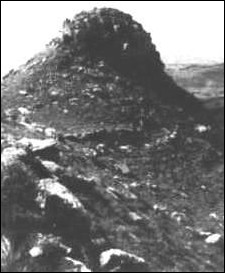
Majuba Hill
Peace talks after the Battle of Majuba (27 Feb). Pretoria Convention: Transvaal Republic obtains limited independence.
1884
London Convention: Transvaal (South African Republic: ZAR) obtains greater independence.
1886
Gold Rush to Witwatersrand begins
1888
Rhodes obtains British Royal Charter for his British South Africa Co. to exploit Lobengula’s territory (Mashonaland and Matabeleland).
1889
Formation of Wernher, Beits and Co, soon to become the principal Rand mining house.
1890
Rhodes BSA Co. (Chartered Company) sends pioneers to occupy Lobengula’s country, renamed Rhodesia.
1892
Rhodes obtains promise of Bechuanaland from Liberal Government.
1893
Loch visits Johannesburg
1894
Rhodes decides Kruger ‘must go’.
June
Loch visits Pretoria
December
Rhodes and Jameson visit England.
1895 January
Kruger toasts Kaiser.
30 May
Robinson arrives in Cape Town as High Commissioner
June
Rand magnates join Uitlander’s National Union.
23 June
Fall of Liberal Government.
25 June
Salisbury forms Unionist Government; Chamberlain appointed Secretary for Colonies.
9 July
Rhodes requests Chamberlain to transfer Bechuanaland.
27 July
Harris arrives in London.
1 August
First interview of Harris with Chamberlain.
2 August
Dispatch of first ‘missing telegram’.
13 August
Interview of Maguire with Chamberlain; dispatch of second ‘missing telegram’.
20 August
Second interview of Harris with Chamberlain.
21 August
Dispatch of third ‘missing telegram’.
28 August
Kruger announces closing of Drifts as from 1 October
5 September
Third interview of Harris with Chamberlain.
6 September
African Chiefs arrive in England
13 September
Interview of Chiefs with Chamberlain.
1 October
Drifts crisis.
2 October
Chamberlain requests information on Johannesburg situation from Robinson.
Mid-October
Johannesburg leaders visit Rhodes to plan rising. Rhodes confides plan to Bower.
18 October
Chamberlain grants Rhodes ‘railway strip’ in Protectorate and permission to recruit from Bechuanaland Border Police. Jameson appointed Resident Commissioner in ‘strip’; begins organising police camp at Pitsani.
20 October
First contingent of mounted police set out for Pitsani from Bulawayo.
28 October
Fourth ‘missing telegram’.
29 October
Fifth ‘missing telegram’.
4 November
Robinson’s dispatch on Johannesburg situation
5 November
Sixth ‘missing [flag] telegram’.
6 November
‘Great Indaba’ at Colonial Office.
7 November
Transfer of Protectorate; seventh ‘missing [fireworks] telegram’. Drifts reopened.
16 November
British Bechuanaland annexed to Cape.
20 November
Jameson visits conspirators in Johannesburg.
21 November
Moberly Bell appoints Younghusband Times Special Correspondent in Johannesburg.
29 November
Harris and Beit sail for South Africa.
30 November
First contingent of mounted police arrive at Pitsani from Bulawayo.
6 December
Chamberlain confirms Robinson’s plan for dealing with rising.
7 December
Uitlander leaders send first telegram to Jameson postphoning rising.
9 December
Willoughby leaves Rhodesia to take up command at Pitsani.
12 December
Flora Shaw sends ‘hurry up’ telegram to Rhodes.
15 December
Transfer of Bechuanaland Border Police completed at Mafeking.
17 December
Rhodes receives second ‘hurry up’ telegram from Flora Shaw. Harris and Beit land in South Africa.
18 December
President Cleveland’s ultimatum on Venezuela. Chamberlain’s ‘hurry up’ letter.
18 – 20 December
Newton in Cape Town
19 December
Interview of Fairfield with Maquire.
20 December
Eighth ‘missing [hurry up] telegram’.
22 December
Younghusband sees Rhodes. Rhodes quarrels with Bower.
23 December
Rhodes telegraphs Jameson, rising will take place as arranged.
25 December
Leonard Manifesto; rising postphoned.
26 December
Uitlanders forbid Jameson to move. Chamberlain warns Salisbury of imminent rising.
27 December
Fairfield hears rumor of ‘fizzle’ of rising and of possible ‘filibuster’.
28 December
Jameson receives ‘Ichabod’ telegram; replies ‘Unless I hear to the contrary shall leave tomorrow evening’. Holden arrives at Pitsani.
29 December
Heany arrives at Pitsani. Chamberlain warns Robinson of possible ‘filibuster’. Jameson invades Transvaal.
30 December
Chamberlain hears news of Raid; leaves for London at midnight. Boers order Jameson to retire.
31 December
Robinson orders Jameson to retire. Chamberlain repudiates Jameson. Reform Committee set up in Johannesburg. Rhodes offers resignation.
1896
1 January
Jameson again ordered to retire. Battle of Krugersdorp. Times publishes ‘letter of invitation’.
2 January
Surrender of Jameson at Doornkop.
3 January
Kaiser’s telegram.
4 January
Robinson arrives in Pretoria.
5 January
Rhodes resigns.
6 January
Robinson meets Kruger.
7 January
Chamberlain promises inquiry into Raid. Reform Committee accept Kruger’s terms.
9 January
Kruger arrests members of Reform Committee.
11 January
Times publishes Jameson’s Ride.
21 January
Raiders sent to England for trial.
3 February
Rhodes arrives in England; existence of ‘Hawksley’ telegrams disclosed to Colonial Office.
6 February
Rhodes sees Chamberlain.
7 February
Chamberlain publishes Uitlander dispatch; invites Kruger to England.
11 February
Opening of Parliament.
13 February
Chamberlain’s ‘fire-hose’ speech
13 – 25 April
Bower in London.
27 April
Trial of Reformers opens in Pretoria. Invitation to Kruger finally withdrawn.
28 April
Death sentences passed on Reform leaders.
29 April
Death sentences commuted. First installments of ‘Bobby White’ documents published.
8 May
Parliament debates Transvaal disclosures. Rhodes prepares to quell Matabele rising.
20 May
Further reductions in sentences.
30 May
Publication of Transvaal Green Book.
June
Robinson and Bower visit England.
6 June
Chamberlain sees ‘Hawksley’ telegrams; offers to resign.
11 June
Reform leaders released from gaol.
15 June
Jameson and officers committed for trial at Bow Street.
17 June
Telegrams returned to Hawksley.
26 June
Rhodes resigns from Board of Chartered Company.
17 July
Report of Cape Committee of Inquiry into the Raid.
20 July
Trial of Jameson and officers opens.
28 July
Jameson and officers sentenced.
30 July
Chamberlain moves for Select Committee to inquire into Raid.
14 August
End of session; Committee of Inquiry lapses.
1897
Sir Alfred Milner takes over as British High Commissioner at the Cape.
26 January
Chamberlain sees Rhodes
29 January
Committee of Inquiry into Raid re-appointed.
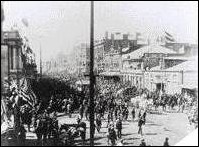
Johannesburg in 1897
5 February
Inquiry opens.
16 February First public session of Inquiry.
28 April
Death of Fairfield.
June
Queen Victoria’s Diamond Jubilee; Kruger releases remaining prisoners.
22 June
Pageant and Procession.
2 July
Close of examination of witnesses by Committee.
13 July
Report of Committee of Inquiry
19 July
Debate on Colonial Office vote.
26 – 27 July
Debate on Report; Chamberlain’s ‘white-washing’ speech.
October
Death of Rosmead.
1898
Kruger elected for fourth term as President of Transvaal. Death of Mead.
1898-9
Milner back in London for ‘holiday’.
1899
31 May- 5 Jun
Bloemfontein Conference
8 Sept
British Cabinet decides to send 10 000 men to defend Natal.
26 Sept
Penn Symons pushes up troops to Dundee.
27 Sept
Kruger calls up Transvaal burghers, and persuades Steyn to follow suit in Free State.
October
Chamberlain challenged to produce ‘Hawksley’ telegrams. White lands at Durban.
7 October
British mobilise 1st Army Corps etc.
9 Oct
Kruger sends ultimatum
11 Oct
Expiry of ultimatum and outbreak of war.
14-16 Oct
Boers begin siege of Kekewich at Kimberley and of Baden-Powell at Mafeking.
20 Oct
Penn Symons gives battle at Talana. Möller surrenders.
21 Oct
Battle of Elandslaagte.
24 Oct
Battle of Rietfontein.
30 Oct
‘Mournful Monday’: Joubert outmanoeuvres White at Battle of Ladysmith (Modderspruit) and Carleton is forced to surrender at Nicholson’s Nek.
31 Oct
Buller lands at Cape Town.
2 Nov
White’s ‘field forces’ accepts siege at Ladysmith.
15 Nov
Botha wrecks armoured train between Frere and Chieveley.
22-3 Nov
Battle of Willow Grange.
23 Nov
End of Botha and Joubert’s raid southwards into Natal. Methuen’s first battle: Belmont.
25 Nov
Methuen’s second battle: Graspan.
26 Nov
Holdsworth, with Linchwe’s Africans, attack Boer laager at Deerdeport.
28 Nov
Methuen’s third battle: Modder River.
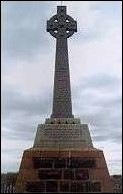
Highlander Memorial-Magersfontein
7 Dec
Hunter’s night raid on Long Tom besieging Ladysmith.
10 Dec
Gatacre’s mishap at Stormberg.
11 Dec
Methuen’s repulse at Magersfontein.
15 Dec
Buller’s first reverse: Colenso.
18 Dec
Roberts appointed to succeed Buller as C-in-C in South Africa, with Kitchener as Chief of Staff.
26 Dec
Baden-Powell’s abortive attack on Game Tree Fort.
29 Dec
German mail-steamer Bundesrath seized by Royal Navy.
1900
January
‘Hawksley dossier’ published in L’Independence Belge; move for fresh inquiry into Raid.
6 Jan
Boers attack Caesar’s Camp and Wagon Hill (Platrand) at Ladysmith.
10 Jan
Roberts and Kitchener land at Cape Town.
24 Jan
Battle of Spion Kop
5-7 Feb
Vaal Krantz captured, then evacuated.
11 Feb
Roberts begins great flank march.
14-27 Feb
Buller’s fourth attempt to relieve Ladysmith.
15 Feb
French relieves Kimberley.
18 Feb
Battle of Paardeberg.
27 Feb
Surrender of Cronjé at Paardeberg.
28 Feb
Buller relieves Ladysmith.
7 Mar
Battle of Poplar Grove. Kruger escapes.
10 Mar
Battle of Driefontein.
13 Mar
Capture of Bloemfontein.
15 Mar
Robert’s first proclamation: amnesty except for leaders.
17 Mar
Boer council of war at Kroonstad.
27 Mar
Death of Joubert.
31 Mar
De Wet ambushes Broadwood at Sannah’s Post.
4 Apr
Surrender of Royal Irish at Reddersburg.
3 May
Roberts resumes march to Pretoria.
4 May
Mahon’s relief column sets out for Mafeking.
11 May
Buller resumes advance.
12 May
Roberts occupies Kroonstad, beats off Eloff’s attack on Mafeking.
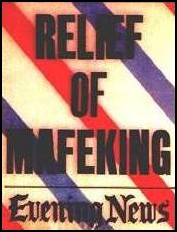
Mafeking Headline
14 May
Buller outmanoeuvres Boers from Biggarsberg.
17 May Mahon and Plumer relieve Mafeking.
28 May
Annexation of Orange Free State proclaimed: renamed Orange River Colony.
31 May
Roberts captures Johannesburg.
Piet de Wet captures Spragge and Irish Yeomanry at Lindley.
5 June
Roberts captures Pretoria. Release of prisoners.
7 June
Christiaan de Wet’s success at Roodewal.
11-12 June
Battle of Diamond Hill
12 June
Buller turns Drakensberg position and occupies Volksrust.
11 Jul
Surrender of Scots Greys at Zilikat’s Nek.
15 Jul
Steyn and de Wet escape from Brandwater Basin.
21 Jul
Roberts begins advance towards Komatipoort.
31 Jul
Surrender of Prinsloo to Hunter in Brandwater Basin.
14 Aug
Ian Hamilton fails to prevent de Wet’s escape.
27 Aug
Buller defeats Botha at Bergendal (Dalmanutha).
30 Aug
Release of last 2000 British prisoners at Nooitgedacht.
6 Sep
Buller captures Lydenburg.
25 Sep
Pole-Carew reaches Komatipoort.
19 Oct
Kruger sails for France on Dutch cruiser.
24 Oct
Buller sails for England.
25 Oct
Formal proclamation at Pretoria of annexation of Transvaal.
6 Nov
De Wet defeated at Bothaville.
29 Nov
Kitchener succeeds Roberts as C-in-C in South Africa.
Roberts to succeed Wolseley as C-in-C at home.
13 Dec
De la Rey and Smuts surprise Clements at Nooitgedacht.
16 Dec
Kritzinger enters Cape Colony.
1901
27 Jan – 26 Mar
French’s drive in Eastern Transvaal.
31 Jan
Smuts captures Modderfontein. Massacre of Africans.
10-28 Feb
De Wet’s ‘invasion’ of Cape Colony.
28 Feb-March
Markham case.
Abortive Middleburg peace talks between Kitchener and Botha.
10 Apr
First drive in Northern Free State begins.
8 May
Milner sails for leave in England.
18 Jul
First drive in Cape Colony northwards.
7 Aug
Kitchener’s proclamation of banishment for Boer leaders captured armed after 15 Sept.
12 Aug
Kritzinger driven out of Cape Colony.
3 Sept
Smut’s invasion of Cape Colony via Kiba Drift.
5 Sept
Scobell captures Lotter’s commando (Groenkloof).
17 Sept
Smuts cuts up 17th Lancers at Elands River Poort; Botha cuts up Gough’s force at Blood River Poort.
26 Sept
Botha attacks Forts Itala and Prospect.
6 Oct
Botha escapes northwards.
11 Oct
Execution of Commandant Lotter. Capture of Scheepers.
30 Oct
Benson killed at Blakenlaagte.
7 Nov
Ian Hamilton appointed Kitchener’s Chief of Staff.
7 Dec
National Scouts inaugurated.
16 Dec
Kritzinger captured.
23 Dec
Kroonstad-Lindley blockhouse line completed.
25 Dec
De Wet captures Yeomanry at Tweefontein.
1902
17 Jan
Scheepers executed.
6-8 Feb
New drive in Eastern Orange River Colony (Orange Free State). De Wet breaks out.
13-26 Feb
Second drive in Eastern Orange River Colony (Orange Free State).
Rawlinson’s success.
7 Mar
De la Rey captures Methuen at Tweebosch.
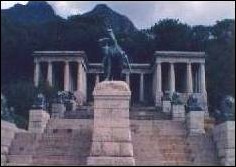
24 Mar
First drive in Western Transvaal.
26 Mar
Death of Rhodes. Destruction of ‘Hawksley’ telegrams?
11 Apr
Battle of Rooiwal.
12-18 Apr
Boer peace delegates’ first meeting at Pretoria.
1-10 May
Last drives in North Eastern Orange River Colony (Orange Free State).
6 May
Zulu attack on Holkrantz.
11 May
End of Ian Hamilton’s last drive in Western Transvaal.
15-18 May
First meeting of Boer delegates at Vereeniging.
31 May
Final meeting at Vereeniging.
Surrender terms signed at Melrose House in Pretoria (see image below).
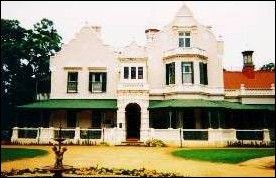
Melrose House, Pretoria
Image courtesy of Louis Engelbrecht
